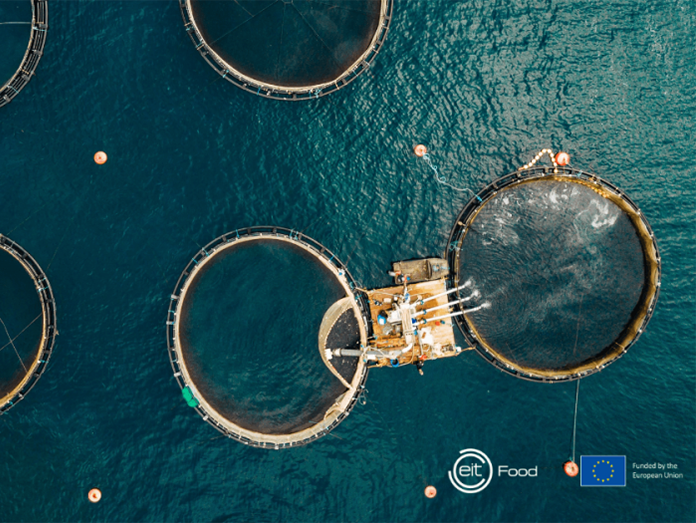EIT Food, established by the European Institute of Innovation & Technology (EIT) and Europe’s leading food innovation initiative, has recently identified a series of new projects to accelerate innovation in the fastest growing food production industry, aquaculture.
The initiative launched a sustainable aquaculture competition to strengthen its portfolio in this area.
According to EIT Food, the aquaculture industry is confronted with multiple challenges, from marine biodiversity loss to water pollution to unsustainable commercial fish feeds. Moreover, while aquaculture products overall (including imports) represent 25% of EU consumption of seafood, EU aquaculture products represent only 10% of EU consumption.
A total of 85 organisations from within and outside the EIT Food community participated in the competition. Seven winning projects were selected and will launch activities to accelerate innovation in the aquaculture sector. The selected projects will make progress in the following areas: Reducing food loss and waste by extending the shelf life of seafood products whilst increasing product safety and quality; Enhancing product quality, fish welfare and reducing likelihood of disease; Producing high-quality and accessible sustainable feeds; Preserving marine biodiversity and ecosystems; Transforming aquaculture into a circular form of food production; Increasing the resilience and competitiveness of the EU aquaculture sector; Strengthening collaboration among stakeholders and addressing skills gaps.
Aquaculture and the European Farm to Fork strategy
The EU Farm to Fork Strategy, which sits at the heart of the EU Green Deal, underlines the potential of farmed seafood as a source of protein for food and feed with a low-carbon footprint. It has an important role to play in helping to build a sustainable food system. As recognized by the European Commission in its recent strategic guidelines, this sector can make an important contribution to the fight against climate change, the reduction of pollution and the protection of ecosystems. It can also be part of a more circular management of resources. Hence, a strategic and long-term approach for the sustainable growth of EU aquaculture is therefore more relevant today than ever.
Greek academia at the heart of sustainable aquaculture
Among the winning projects from EIT Food’s sustainable aquaculture competition, two are linked to Greek universities:
The Sustainable Seafood Processing (SuSeaPro) project will develop novel processing technologies that extend the shelf-life of seafood products, that do not rely on additives or heat treatment, to reduce food loss and waste from farm to fork. The project will also improve food safety and enhance consumer perception by reducing the microbial growth of harmful pathogens. The project is supported by SuSea (The Netherlands), the University of Aarhus (Denmark), and the Agricultural University of Athens, Greece.
Mark Chryssolouris, CEO SuSea, stated that “It is a great honour to have project SuSeaPro accepted into EIT Food’s 2021 Business Plan, especially given the tough competition that we faced! The aim of SuSeaPro is to scale up a processing technology which improves the quality and safety of food. This way we can improve public health by reducing the prevalence of harmful pathogens such as listeria and reduce food waste at the same time.”
The AGAPE: Aquacultural Global AI Platform for Europe’s Skills Passport project which represents an AI-based collaborative platform. This platform addresses the EU aquaculture market, academia, consumers and research ecosystems. AGAPE is first in bringing an innovative model of interaction between stakeholders. It will broaden community on skills, capabilities and competencies, globally and in real time.
The project is headed by Milcoop BC (Italy), Federpesca (Italy), Gargano Pesca Consortium (Italy), the University of Peloponnese (Greece), and Focos (Germany).
The rest of the projects
The Next Tuna: Creating a Sustainable Tuna Industry project will create the first sustainable European source of tuna by reproducing Atlantic Bluefin Tuna in a land-based, eco-friendly recirculating aquaculture system.
Project Consortium: Next Tuna GmbH (Germany), The Spanish Institute of Oceanography (Spain), Wageningen Livestock Research (The Netherlands) and Seafarming System AS (Norway).
The Ground-breaking Circular Economy Feed Ingredient for Farmed Salmon project will develop a fish feed for salmon that contains protein from recycled wastewater in the starch industry. The project will support the natural defence mechanisms of salmon by supporting their basic biological functions, while preventing disease.
Project Consortium: Cewatech (Sweden), Technical University of Denmark (Denmark) and Matis (Iceland).
The BREEZE: A revolutionary eco-friendly system for fish health management project that will enable the successful scaling of sustainably managed fish farms, to meet the growing demand for healthy proteins.
Project Consortium: Aqua Pharma Group (Norway), Pulcea (UK), University of Stirling (UK) and the Norwegian University of Science and Technology (Norway)
The DELTA FUTURO: Shellfish juvenile production model, an optimised sustainable shellfish farming system, that aims to guarantee the wellbeing of shellfish juveniles and ensure food security for future consumers.
Project Consortium: Delta Futuro (Italy), Biores Soc Coop (Italy) and Foundation Seashell (The Netherlands).
And the Just Add Water: Utilising world-leading technology to minimise environmental impact and maximise fish welfare of farmed salmon project that will grow Atlantic salmon in recirculating aquaculture systems, throughout the EU.
Project Consortium: FishFrom Ltd. (UK), University of Trento (Italy), University of Bologna (Italy), Hub Innovazione Trentino (Italy).



















